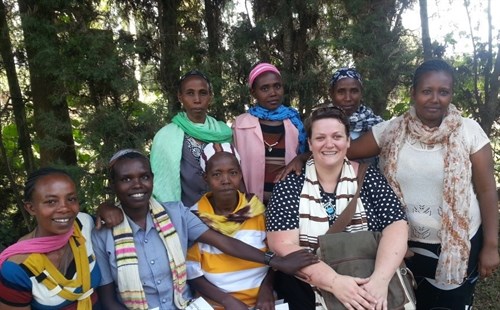
Beth Hollihead, 21 November 2014
Last week, during a somewhat intense and very busy REACHOUT consortium meeting hosted in Hawassa, Ethiopia, we were lucky enough to have the opportunity to have a field visit to a district health office, and a local health post, operating under the Ethiopia Health Extension Worker (HEW) programme. As a “non-technical” project manager, in other words primarily responsible for the administrative, regulatory and financial management of our global research consortium, this was a first for me and a trip that I found fascinating and inspiring in equal measure.
Our visit began after lunch, with me in the front seat of a minibus. I’d been unwell earlier in the week and I think the team felt I should be both comfortable and ideally at a bit of a distance! The arrangement afforded me a great view, and dominion over the radio, so I was pretty happy. We drove south, on a road which eventually leads to Kenya, much to the enjoyment of our Kenyan colleagues. After a brief stop at the district health centre where we were welcomed by the district supervisor we eventually reached our target health post (chosen by the team in Ethiopia), in Howoleso Kebele (village). Once past the crowd of over-excited school children, most proudly dressed in the Ethiopia national football kit, we entered a neat, fenced off compound and immediately saw a group of 15-20 women, in various stages of pregnancy, seated on cushions on a shady patch of grass. This was the bi-weekly Pregnant Women's Forum, and we were lucky to have chosen their meeting day for our visit. Ably assisted by REACH Ethiopia team, Miriam Taegtmeyer said a few formal words of thanks and we were then free to wander and talk to people as we liked (interpreters permitting!)
First stop was the main room of the health post (which was a single story, 3 or 4 room building set up some high concrete steps). Here is the room where Yegnanesh Teshome does her work. Yegnanesh is one of two HEWs based in this kebele. They provide a package of preventative, curative and informative healthcare for the c.8000 men, women and children of the kebele. Yegnanesh is rightly proud of the service she provides, for which she received an original 12 months training.
She told us she enjoys family planning the most among her duties, and showed us chart after chart on her walls documenting her activities and successes of the year to date. Our team now turned inquisitors, with colleagues from Malawi and Kenya in particular gleaning every ounce of information about the practicalities, responsibilities and logistics of her role. We had to almost physically drag them away to give her a moment’s peace and then they started again in the garden! It actually said more for the impressiveness of the HEW Programme than seeing the health post itself, to see how researchers from other countries were astounded at the success and smooth running of this post.
When the questioning got too technical for me, I walked outside for some air and a look around the compound. The forum had now finished, but several of the women had stayed behind: to chat, because they had ante-natal visits booked or just for a few more minutes sitting down. I took the opportunity to speak to the women (with Nega Tekiyie of REACH Ethiopia as my interpreter) and ask about the forum, and what made them come. The next 30 minutes were the highlight of my entire week as we chatted, like mums do, about the worries of pregnancy, of how to look after a newborn, of what to eat and what not to eat and what to expect when you deliver. These women were all expecting for the second, third or even fifth time, and yet they all felt they had something valuable to learn from the forum, and they unanimously agreed that they would be coming for their next baby too (except the woman who was expecting number 5 – she hopes NOT to return, as she feels that 5 is the perfect number of children). Their love of education was strongly felt, as was their enjoyment of a little time away from the family, although it was commented that this is not always easy. What a pleasure it was to chat so naturally, giggling about our kids. Eventually we sat and looked through the photo gallery of my phone, laughing at silly pictures of my son. Nega then took some pictures of us a group, which we showed to the women and promised to send some prints back – one for each woman. I don’t think I will forget Howoleso, or the women who meet there to learn about looking after themselves and their family. What a way to learn more of the Ethiopian HEW programme, and what a way connect to the region. A precious memory for me indeed.
Recent news
- REACH Ethiopia win the Kochon Award for their services to TB, 29 October 2014
- REACHOUT honourable mention in photo competition, 20 October 2014
- REACH Ethiopia nominated for the 2014 Kochon Prize, 9 October 2014

This project is funded by the European Union.
